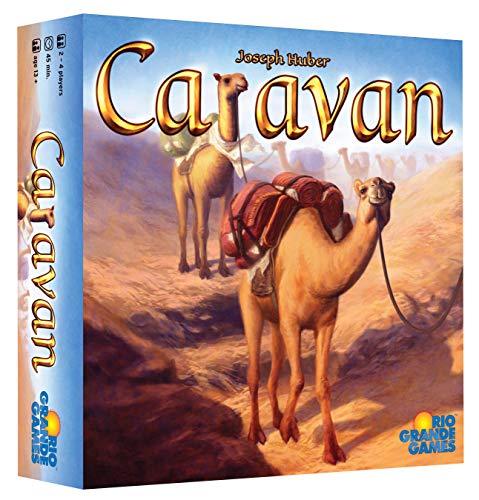Caravan Board Game Review: The charm and strategy of a camel caravan cruising through the desert
A strategic pickup and delivery game set on the trade routes of West Africa, where you use camels to transport goods.
In this article, we will provide a thorough review of Caravan, released by Rio Grande Games, from its appeal to any concerns you may have.
This game can be played by 2-4 people, takes about 45 minutes to play, and is recommended for ages 14 and up.We will explain in detail what kind of players it is recommended for, along with the actual gameplay experience.
By the time you finish reading, you'll have a good idea of whether this game deserves a place on your gaming shelf.
Game Basics
Caravan is a board game for 2-4 players set in the deserts of West Africa.
Caravan is a board game for 2-4 players, takes approximately 45 minutes to play, and is recommended for ages 13-14 and up.
Designed by Joe Huber and published by Rio Grande Games.
Core Game Mechanics
Classified as a network-building, pickup and delivery game, Caravan centers around players deploying camel caravans to deliver goods to desired locations.
The West African desert is depicted abstractly on a 7x7 grid, with eight desert cities and eight commodity spawn points.
Each player forms a caravan of five camels and receives one theft marker.
Action System Features
The game starts differently: the first player takes 1 action, the next takes 2, the next takes 3, and the last takes 4, and then everyone takes 4 actions each turn.
The main actions are:
- Place and move a camel to an empty space (1 action)
- Move to a space with another camel (2 actions)
- Product collection (1 action)
- Moving and delivering goods (1 action)
- Theft (1 action, requires a Theft Marker)
The appeal of Caravan: A masterpiece that lets you experience deep strategy in a short space of time
Despite the simple rules, players can enjoy deep strategic gameplay.
Simple rules hide deep strategies
The rules for Caravan fit on one page, making the game easy to understand and digest.
Dale Yu describes it as "an old-school game that can be explained in minutes, but offers great depth in actual play."
On a 7x7 board, a line of five camels can traverse almost the entire desert, but moving around creates a dilemma: it takes too many actions to position the camels in the right places, leaving you with insufficient time to retrieve and move goods.
Dynamic Network Construction System
The most interesting aspect of Caravan's design is how it subtly changes the typical networking game.
In Steam and Ticket to Ride, players build static networks, but Caravan has the unique feature of building dynamic networks.
You try to connect loaded camels to cities of the same color, but just because they're connected to a blue city now doesn't mean they'll be connected later.
With only 5-6 camels available, players try to arrange their networks to be as efficient as possible.
Exquisite theft system
The stealing mechanic is an ideal system for reducing a potentially highly offensive gameplay element to a tactical choice.
You start the game with only one Theft Token, and the only way to get more is to have something stolen from you.
This also ensures that no single player is targeted at any one time.
There is fierce competition for the cubes (goods), with races to pick them up and fights to win the right to be the first to steal the precious cubes.
There's a strategic element to this game: it's often better to steal a cube from someone than to pick it up, and the cube is protected until you move it.
A balance between planning and opportunism
Caravan is definitely a game of tactics and opportunism.
Like the sands of the desert, opportunities are constantly changing as players pick up and deliver goods.
Demand markers work like a reverse Dutch auction - when does the stack of markers outweigh the difficulty of the task?
Who will make the first move?
Another appealing feature is the chicken element, which allows players to stack markers.
Concerns and solutions
We will explain Caravan's weaknesses and how to deal with each one.
Abstraction of the theme
Despite the well-chosen theme, some have pointed out that the game feels a bit abstract while playing.
Some harsh criticism has been that it's abstract, instantly destroys immersion, and completely destroys any sense of immersion the title may have had.
Solution: This issue can be alleviated by focusing on the fun of the game mechanics and enjoying it as a tactical "themed abstract game."
Players familiar with Euro-style games will likely appreciate this sophisticated abstraction.
Complexity of game management
The refilling sections of the game have been noted to cause a lot of stops and starts, disrupting the flow of gameplay by interrupting individual turns.
Solution: It can be difficult to track when to refill when only four items remain on the board, so a better flow can be achieved by having all players closely monitor the board and be aware of when to refill in advance.
Likes and dislikes of theft actions
The thing is, some players may not like stealing.
Countermeasure: Stealing actions are also fair, with everyone having the ability to steal once at the start of the game, and then only the player who was stolen from can steal again.
The system is balanced because when you steal, you give the theft marker to the other player, giving them permission to give it back later.
For groups that prefer cooperative games, we recommend toning down this element.
Recommended for these people and occasions
We will introduce the players and gameplay scenes that Caravan will be particularly enjoyable for.
The ideal player
It's short, simple, tight, interactive, and perfect for people who like clever games of tactic and opportunism and don't mind these traits appearing in a Pick Up & Delivery package.
For family gamers
While its complexity may be a little higher than you'd choose as a gateway game, the simplicity of its rules makes it a continuing contender in this category.
It's a good introduction to Euro games, but is especially recommended for families who are somewhat familiar with games.
For experienced gamers
This game hits the sweet spot for me.
It's simple enough to be taught in minutes, yet offers a satisfying experience even for seasoned gamers, as evidenced by the game's many features.
Recommended play scenes
Game party for 3-4 people
No one will turn down Caravan with any number of players, but three players is the most preferable, followed by four.
Three-player games are more crowded, require more action, and offer more interaction with potential theft.
Warm-up before the main game
With a 45 minute play time, it makes a great pre-game addition to your game night.
Expected effects
- Improve your strategic thinking : Look at the board and plan how to get your cubes to the destination city, and moments where you have to step back and think will help you hone your planning skills
- Resource management skills : Experience the utmost efficiency with a limited fleet of five camels
- Opportunity recognition : Improve your decision-making skills in an environment where opportunities are constantly changing, like desert sands.
Caravan has the feel of a classic Euro game and would look great alongside lighter-themed abstract games like Through the Desert, Azul, or Splendor, without feeling inferior by comparison.
If you're a player who wants to experience deep strategy in a short amount of time, this is definitely worth giving it a try.
Check the product on the online store page
Free shipping throughout Japan. Orders placed before 3pm will be shipped the same day.
Reference source/quote source

